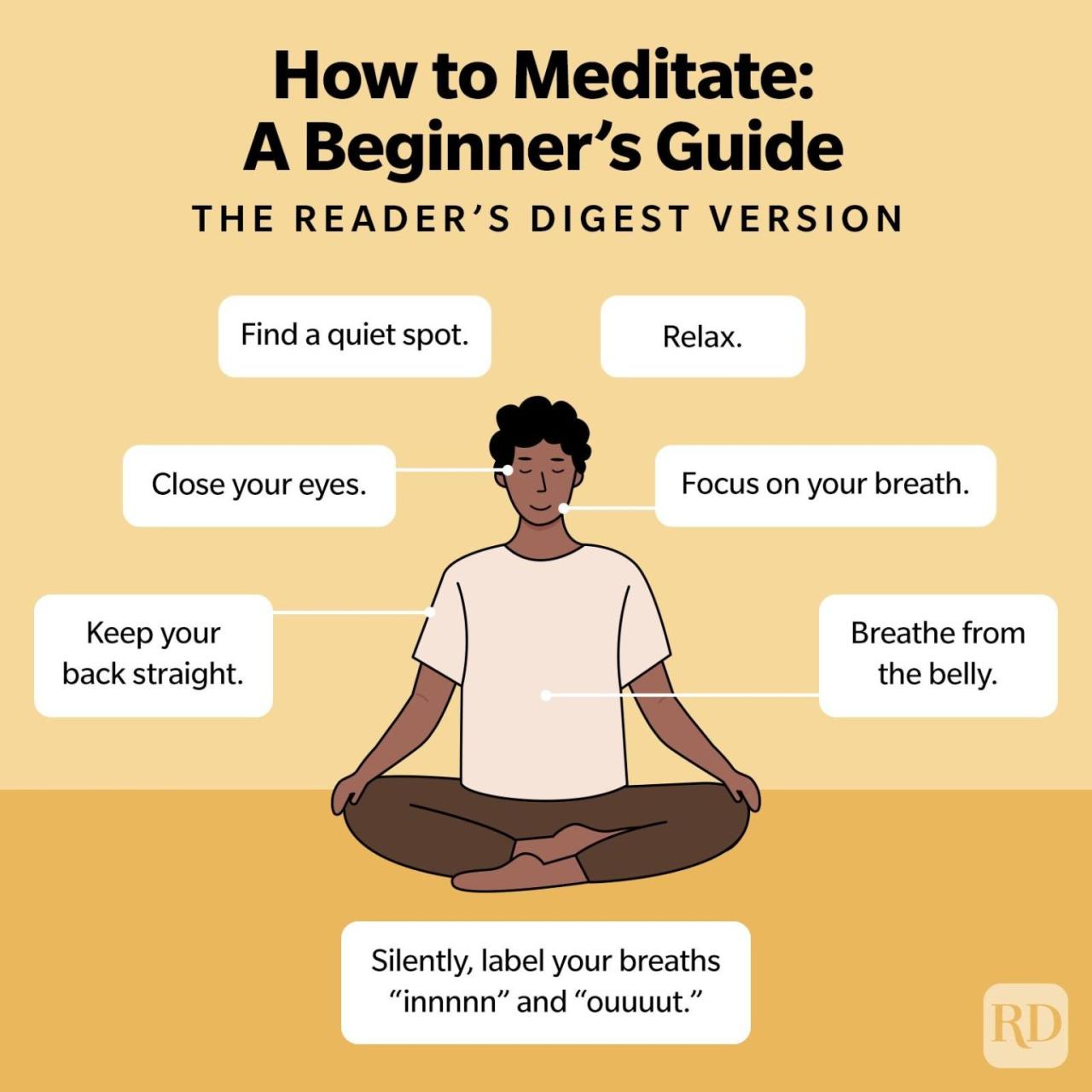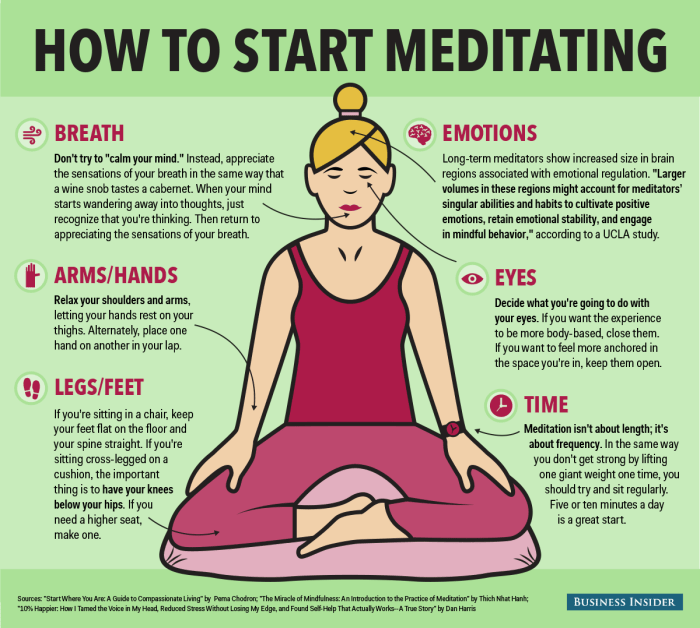Meditation for Beginners takes center stage, inviting you into a world of mindfulness and mental well-being. Dive into popular techniques, set up your space, and master breathing exercises for a fulfilling practice.
Overview of Meditation for Beginners

Meditation is a practice that involves focusing the mind and eliminating distractions to achieve a state of mental clarity and emotional calmness. It has numerous benefits for both physical and mental health, including reducing stress, improving concentration, and promoting overall well-being.
Why Meditation is Suitable for Beginners
Meditation is a great way for beginners to start their mindfulness journey because it does not require any special equipment or prior experience. It can be practiced anywhere and at any time, making it accessible to anyone looking to improve their mental health.
How Meditation Can Improve Mental Well-being
- Reduces stress and anxiety levels, promoting a sense of calmness and relaxation.
- Enhances concentration and focus, leading to increased productivity and mental clarity.
- Helps in managing emotions and developing a positive outlook on life.
- Improves self-awareness and promotes a sense of inner peace and contentment.
Types of Meditation Practices
Meditation has a variety of practices that beginners can explore to find what works best for them. Here are some popular types of meditation suitable for beginners:
Mindfulness Meditation
Mindfulness meditation involves focusing on the present moment without judgment. Beginners can start by paying attention to their breath or body sensations.
Loving-Kindness Meditation
Loving-kindness meditation, also known as Metta meditation, involves cultivating feelings of love and compassion towards oneself and others. It can help beginners develop empathy and kindness.
Guided Meditation
Guided meditation is a great way for beginners to start their practice. There are many resources available, including apps, podcasts, and videos, that provide guided instructions and help beginners stay focused.
Transcendental Meditation
Transcendental meditation involves silently repeating a mantra to quiet the mind and achieve a state of pure awareness. This technique can be beneficial for beginners looking for a structured approach to meditation.
Setting Up a Meditation Space
Creating a peaceful and serene environment for meditation is essential to enhance your practice and overall experience.
The Importance of a Quiet and Comfortable Space
Having a quiet and comfortable space for meditation allows you to focus inward, free from distractions. This setting helps promote relaxation, mindfulness, and a deeper connection with yourself.
Tips for Creating a Calming Atmosphere
- Avoid clutter: Keep your meditation space clean and organized to promote a sense of calm.
- Use soft lighting: Opt for natural light or soft, warm lighting to create a soothing ambiance.
- Add plants or natural elements: Incorporating elements from nature can help create a sense of tranquility.
- Play calming music or sounds: Background music or sounds like nature recordings can enhance the peaceful atmosphere.
Recommendations for Essential Items
- Meditation cushion or mat: Provides comfort and support during meditation.
- Incense or essential oils: Aromatherapy can help set the mood and promote relaxation.
- Candles: Soft candlelight can create a serene atmosphere and aid in focus.
- Sacred objects: Items like crystals, statues, or images that hold personal significance can enhance your spiritual connection.
Breathing Techniques for Meditation: Meditation For Beginners

Breath awareness plays a crucial role in meditation as it helps to anchor the mind in the present moment and cultivate a sense of calmness. By focusing on the breath, beginners can train their minds to let go of distractions and enter a state of mindfulness.
Deep Breathing Exercise
One effective breathing technique for beginners is deep breathing. Start by sitting or lying down in a comfortable position. Inhale deeply through your nose, expanding your belly as you breathe in. Hold your breath for a few seconds, and then exhale slowly through your mouth, releasing any tension. Repeat this process several times, focusing on the sensation of your breath moving in and out of your body.
Counting Breath Exercise
Another simple breathing exercise is counting breaths. Close your eyes and take a few deep breaths to center yourself. Then, begin to count each inhale and exhale, starting from one and going up to five. Once you reach five, start over from one. This practice helps to maintain focus and prevent wandering thoughts during meditation.
Alternate Nostril Breathing
For a more advanced breathing technique, beginners can try alternate nostril breathing. Sit comfortably with your spine straight and close your right nostril with your right thumb. Inhale deeply through your left nostril, then close your left nostril with your ring finger and exhale through your right nostril. Inhale through the right nostril, close it, and exhale through the left nostril.
This practice balances the flow of energy in the body and promotes relaxation.
Common Challenges Faced by Beginners
Starting a meditation practice can be challenging for beginners, as it requires focus, discipline, and patience. Many obstacles may arise during the journey of learning to meditate, but with persistence and the right strategies, these challenges can be overcome.
Distractions
Distractions are a common challenge faced by beginners during meditation. It can be difficult to quiet the mind and stay focused when external noises, thoughts, or physical discomforts arise. To address this issue, beginners can try using earplugs, finding a quiet space, or practicing mindfulness techniques to bring their attention back to the present moment.
Restlessness, Meditation for Beginners
Feeling restless or fidgety while trying to meditate is another challenge that beginners often encounter. To combat restlessness, beginners can experiment with different meditation postures, such as sitting, lying down, or even walking meditation. Additionally, incorporating gentle movement practices like yoga or tai chi before meditation can help release excess energy and promote a sense of calm.
Impatience
Impatience is a common obstacle that beginners face when starting a meditation practice. It’s important to remember that meditation is a skill that takes time to develop, and progress may not be immediately noticeable. Practicing self-compassion and cultivating patience are key to overcoming feelings of frustration or impatience during meditation sessions.
Consistency
Maintaining a consistent meditation practice can be challenging for beginners who lead busy lives or struggle to find the motivation to meditate regularly. Setting a specific time each day for meditation, creating a dedicated meditation space, and starting with short sessions can help establish a routine and make meditation a habit. Remember, consistency is key to reaping the full benefits of meditation.
Self-judgment
Beginners may also experience self-judgment or self-criticism during meditation, especially if they feel like they’re not “doing it right.” It’s important to approach meditation with a sense of openness and curiosity, rather than striving for perfection. Embracing a non-judgmental attitude towards oneself and practicing self-acceptance can help beginners navigate through these challenging thoughts and emotions.
